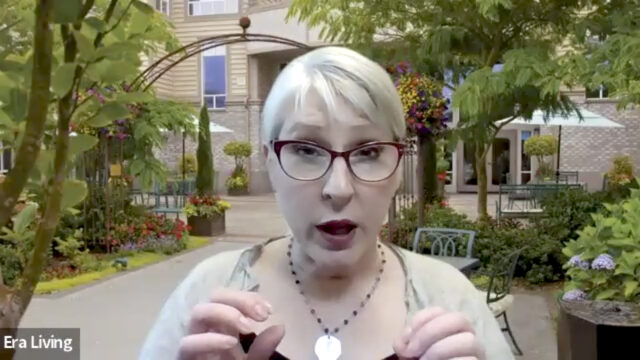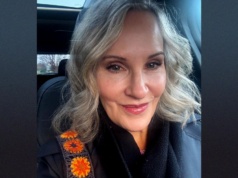After you’ve decided what you want later in life when you can’t care for yourself, it’s time to sit down with your family to get them on board. Telling them the benefits to you, how important your future is, is important. Tina Hall from Era Living joins Suzanne to talk about these considerations.
Every family member wants what’s best for their parents and kids. Everyone has an idea of what that looks like, and if plans aren’t made ahead of time, conflict comes up. Talk, take tours. Tell them you’re in an early research phase, you’re not going to move this month, this year, or maybe even three years from now, you just want to find out what the lifestyle is like, how much it costs, and if they can care for your health issues.
Learn more about Tina Hall, and there’s more about Era Living at Answers for Elders and eraliving.com.
Suzanne: And welcome back everyone to Answers for Elders Radio Network. And we are here with a wonderful individual that I have known for a long time, Tina Hall from Era Living in Seattle, and for those of you that may have a senior loved one in Seattle, I strongly encourage you if you are thinking about taking a step into senior living, or just wanting to know what it’s all about, please reach out to Era Living, it’s eraliving.com. They are an amazing organization, and I am so honored and privileged to feel like an extended member of the team now. So it’s really pretty fun.
So Tina, you and I have been talking in our first segment about just having that conversation with yourself, and deciding what it is that you want, and going through those scenarios of, if I’m in a situation where I need care and I can’t take care of my house anymore, what do I need to know, and what do I need to do? Once you’ve made those decisions, the next question would be to have those conversations with your family. Is that correct?
Tina Hall: I would say so. It makes it a lot easier if you get everybody on the same page. I think it’s challenging when you have family, whether it’s your adult daughter or whoever that is reluctant for you to make any steps forward, because they’re afraid of what it means. You know, I think we’re all afraid of our parents, our health, we’re afraid of losing our childhood home. But the truth is, once you’ve made a decision to move forward, getting your family to talk about it and to understand the benefits to you, and how important your future is. You know that really, really matters, and it’s often gonna be several conversations. Whether you are the adult child, having a conversation with your parent and opening up the conversation, or whether you are the individual and you’re talking to your adult children about it, you can initially meet a little bit of resistance, because there’s a lot of fear — change can be scary. So anticipate it being a few conversations, and just go gentle, knowing it is OK that everybody is not initially on the same page. You can get there.
Suzanne: Be gentle, and part of that is, I strongly encourage people, don’t spring the conversation if you’re an adult child and say, mom and dad, we’re here and we want to talk to you about something. It’s like give them an opportunity to marinate on the idea before you have that conversation. Because, bottom line is, and I will tell you that I tell every family this, nobody moves to a senior living community that is not their decision, right? If you’re going to make that change, it’s because you chose to go there, unless you’re beyond anything and you can’t take care of yourself. Obviously, that would be one thing. But the point of the matter being is, is that I do believe number two, that every family member wants what’s the best for their loved one. I don’t think that there’s anybody out there that says I just want mom to rot in home and I don’t care, right? That that is not what happens, right? But the point of the matter being is, everyone has an idea of what that looks like. And so that I think in my mind is what causes conflict is when that loved one did not make the plan. If mom or dad did not make the plan, and saying this is our desire and this is what we wanna do, now the conversation is, how are we gonna accomplish it? How are we gonna execute it, because there isn’t the argument anymore. And I think that is one of the keys. What would you say, Tina?
Tina Hall: I would say initially, I think oftentimes people think, “I don’t ever want to do that.” But oftentimes it really is because they have no idea what “it” is. Don’t have any familiarity with all the different options available to them. And so there’s this huge fear of moving somewhere and suddenly being obsolete, or having no choices in your life, or having to go here and do whatever people tell you to do, and that is not what senior living is all about. But until people can start doing a little bit of research, and just opening that conversation, and talking about the possibility of what it could be, what they want it to be, and then start looking for that, there’s going to be that wall. So if you individually are thinking, “well, this might be something I want to do in my future,” start looking, start reading, start educating yourself.
Suzanne: Take a tour!
Tina Hall: Take more than one tour.
Suzanne: And have a meal, and there’s no obligation, and be upfront when you’re there, saying “I’m in the early research phase. I am not in a situation where I’m going to be moving this month, I may not even move this year, I may not even move for three years. And I just need to know what’s out there. What the lifestyle is like, how much is this gonna cost me financially? How does this work within my care plan? Can you provide care based on, maybe I have a mobility challenge, or something like that?” Those are questions that will help you determine, as our listener, what is the right option for you and your loved one.
And that’s the other side. There’s a whole aspect of a spouse. If you and your spouse are together, are you going to make the decision of number 1), you’re gonna both stay together and if one of your, one of you gets sick and cannot take care of themselves, you’re gonna have to bring care into your home. What does that look like? How much does that cost or are you going to stay together and move to a community where your loved one can be on an assisted living type of care, and that’s called a flexible license, that the senior living community can provide different levels of care to the same apartment. And that I think that’s important.
Tina Hall: With flexible licensing, and I know that there are a number of communities that do it. It’s an important question to ask when you are touring, especially if you are moving in with a spouse and your spouse needs care. You don’t want to feel like they have to live in the assisted living building, and you have to live in the independent living building. When a community has flexible licensing, and you move in independently, they simply apply an assisted living license to the apartment you’re already living in, so that you don’t have to move to a different section of the building to have care. And you don’t both have to have assisted living needs to live together in a community that does offer flexible licensing like that. But it’s important to ask that, because believe it or not, not everybody does it. I don’t know why. But it’s a good question to ask, any other questions which we can talk about.
Suzanne: Absolutely. And you know, think about these things as far as what can happen with you and your spouse. Remember people are living longer today than they ever have before. I am seeing all the time seniors in their 90s that we never used to see before. Not in my mother’s generation, rarely. And it’s fascinating to see how vibrant so many 90-year-old people are, they are living longer, and so we have to look at those options. What is going to happen if I outlive my money? And Tina, you and I are gonna talk about this in our next segment. Look, let’s say your life is longer than how much money you have. We’re gonna come back and talk a little bit about that. Also we’re gonna finish out with, what kind of questions should you be asking your community. And Tina, and I will be right back right after this.











